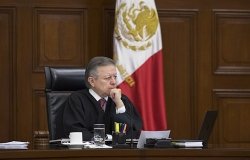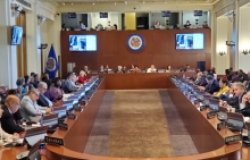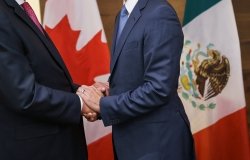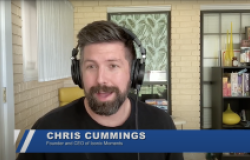Visiting Iraq
Former Congressman Lee Hamilton describes his recent trip to Iraq with the Iraq Study Group.
Iraq is a distant war in a distant place to most Americans. Recently, I traveled to Baghdad as part of my work on the Iraq Study Group, a bipartisan group committed to making recommendations on how the United States should move forward in Iraq, founded at the urging of a group of members of Congress and welcomed by the President. We are not ready to issue our recommendations, but we left Baghdad with some stark impressions.
The insecurity is immediately apparent. From an American air base in Kuwait, we flew to Baghdad on a C-130 military transport plane also carrying U.S. troops wearing heavy gear. Because of concerns about anti-aircraft weaponry, we had to put on helmets and flak jackets as we approached the city. Instead of a normal descent, the plane drops sharply while making several circular turns, quite like a corkscrew, to avoid incoming fire.
On the ground we encountered an intense and dry heat. Without removing our helmets and flak jackets, we were moved to helicopters since the road into town is too dangerous. For several minutes, we flew over sprawling brown, low-rise housing and the occasional burned out block. The helicopters automatically shoot off flares as a precaution against shoulder-fired missiles, and a gunner leans out an open window to respond to any threat in the city down below.
We landed in the International Zone (I.Z.), an enclave in Baghdad with a roughly three-mile perimeter, home to wide boulevards, foreign missions and most of Iraq's government ministries. We were driven to the U.S. embassy, which is currently in one of the palaces formerly used by Saddam Hussein. The I.Z. is much safer than the rest of Baghdad, but it is still filled with checkpoints, security barriers, and heavy speed bumps, and there is a threat from "indirect fire" lobbed over the I.Z.'s walls. Occasionally during our visit, we heard the thud of an explosion off in the distance.
From day to day, we were driven from compound to compound to meet with Iraq's political leaders, including the President and Prime Minister. From what we heard, it is clear that the Iraqi government must take urgent action on several fronts to hold the country together: providing a higher level of security, particularly in Baghdad; providing basic services like electricity and water; and taking tangible steps toward national reconciliation among Iraq's Shia, Sunnis, and Kurds – particularly by bringing Sunnis into the process of governing. Whether they have the political will to put aside sectarian differences and the capability to govern remain open questions.
The backdrop is the persistent violence beyond the walls of the I.Z. In talking to Iraqis in and out of government, we heard anecdotal evidence to match the casualty numbers – peoples' family members being assassinated, close calls with suicide truck bombers, or nightmarish stories of group executions. Sadly, many Iraqis who have put their necks on the line – for instance by leading a civil society organization or cooperating with U.S.-led coalition forces – face the greatest risk.
We also met with many U.S. officials, civilian and military. America has much to be proud of. Our troops are in a difficult situation, facing many sources of violence. In Baghdad, they are literally going house to house in search of a difficult enemy, just as they try to stand up Iraq's security forces. Often, they work patrols in heavy armor in heat running well over one hundred degrees. As we tried to sleep at night, we heard helicopters flying overhead bringing in wounded Americans.
I met with one of the physicians who works to keep those troops alive, often treating those brought in by the helicopters. He told me grim stories, as many of the injuries are severe and life-altering, and the casualties keep coming. His commitment is shared by thousands of American civilians from all walks of life working in Iraq – a foreign service officer trying to bring Iraq's disparate groups together; a prosecutor helping Iraqis set up their judicial system; a retired military officer trying to help Iraq tackle the huge problem of their militias. Many live in small trailers behind the U.S. embassy, far from the comforts of home, doing hard and emotionally wrenching work.
For Americans back home, it is hard to put the faces – both Iraqi and American – with the casualty numbers, and it is hard to remember that Iraq is more than a political issue – it is a country confronting enormously problems. Flying out over Iraq's southern desert, you quickly pass out of this troubled world, but you do not soon forget it.










